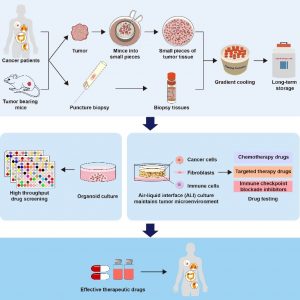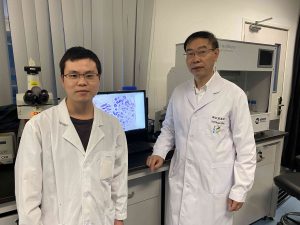A research team led by Chuxia Deng, chair professor in the Faculty of Health Sciences (FHS) at the University of Macau (UM), has established a biobank of living tumour tissues in collaboration with Kiang Wu Hospital. Standardised cryopreservation technique is used to freeze tumour tissue specimens obtained during early surgical procedures. In cases where tumour samples are unavailable during recurrence or metastasis, the frozen tissues can be revitalised for organoid culture, providing support for potential personalised treatment options for cancer patients or further cancer research. The research has been published in the international journal Bioactive Materials.
A biobank involves the collection and storage of substantial quantities of biological specimens, along with associated personal data such as medical records, family history, lifestyle information, and genetic data. In recent years, there has been a notable increase in the number of large-scale biobanks being established, including those for tumour tissues and other samples. These biobanks typically store specimens under cryogenic conditions using ultra-low temperature freezers or liquid nitrogen. Unfortunately, these storage methods often kill the cells. The specimens can then only be used to extract proteins, DNA, or RNA, and cannot be used to cultivate live cells. This significantly limits their overall value and potential applications.
To address this challenge, the UM research team proposed the novel concept of establishing a biobank of living tumour tissues. They developed a standardised technique in which the tissues are gradually cooled and transferred to liquid nitrogen for long-term preservation. This technique redefines tissue biobanking, as it enables the cultivation of patient-derived tumour organoids (PDOs) from cryopreserved tissues, while supporting air-liquid interface (ALI) cultures and preserving the original tumour immune microenvironment. This technique successfully maintains tissue viability, and holds great promise for advancing personalised precision cancer treatment and research.
In the study, the research team tested 42 pairs of frozen human tumour specimens. Tissue samples from four different cancer types—breast cancer, colorectal cancer, lung cancer, and kidney cancer—were used to establish PDOs. The results showed that organoids could be successfully cultivated in 40 out of 42 cases, achieving a success rate of 95.2%. Notably, the tumour samples could still be used to establish organoid models even after nearly four years of cryopreservation. The study also demonstrated the applicability of this technique for effectively cryopreserving small specimens, including biopsy tissues.
This living tissue cryopreservation technique is simple and easy to operate. It enables various tumour specimens to be frozen long term while maintaining the viability of the cells within the tumour tissues. Organoids derived from these tissues can be routinely frozen and passaged, enabling high-throughput screening of drug sensitivity and identification of potentially effective drugs to combat drug-resistant tumours. Moreover, cryopreserved tumour tissues retain the original tumour microenvironment, making them suitable for ALI cultivation and evaluation of anti-tumour drug responses, including immune checkpoint inhibitors. The study expands the concept of biobanking and lays the foundation for establishing living tissue biobanks, providing substantial support for precision cancer treatment and translational medical research.
Prof Deng is the corresponding author of the study, and Chen Ping, research assistant professor in FHS, is the first author. FHS postdoctoral researchers Zhou Jingbo and Feng Yangyang and FHS doctoral student Chu Xiangpeng also made significant contributions to the study. The project was funded by the National Key R&D Program of China (File No.: 2021YFE0206300), the National Natural Science Foundation of China (File No.: 82030094), UM (File No.: CPG2023-00031-FHS and MYRG-GRG2023-00029-FHS-UMDF), and the Science and Technology Development Fund of the Macao SAR (File No.: 0009/2022/AKP, 0004-2021-AKP, 0007/2021/AKP, 0092/2020/AMJ, 0054/2023/RIA1, and 0082/2022/A). The full version of the research article is available at: https://www.sciencedirect.com/science/article/pii/S2452199X24003955.
| Source: Faculty of Health Sciences | |
| Media Contact Information: | |
| Communications Office, University of Macau | |
| Albee Lei | Tel: (853) 8822 8004 |
| Bell Leong | Tel: (853) 8822 8009 |
| Email: | prs.media@um.edu.mo |



